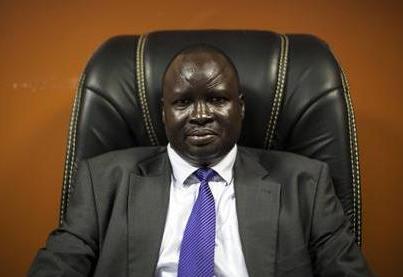Former defence official wants Kiir and Machar out
October 23, 2016 (JUBA) – A former Deputy Defence Minister in the government of South Sudan has warned that the country could disintegrate into ethnic enclaves if President Salva Kiir and his former deputy in government and party turned rebel leader, Riek Machar, do not step aside.

The former official, according to IBTimes UK, asserted that peace can only be achieved in the country only if both President Kiir and rebel leader, Machar, are excluded from the political process in South Sudan.
South Sudan became the world’s newest nation after declaring independence from Sudan in 2011. However, in 2013 the country was plunged into civil war, as President Kiir, who hails from Dinka ethnic group – fired his deputy Machar – from ethnic Nuer group – and his cabinet.
Ethnic-related violence has spread, with militia groups carrying out attacks in villages and areas known to be inhabited by either the Dinka or Nuer tribes.
As many as 50,000 people have been killed – as per estimates by the United Nations – amid allegations of crimes against humanity committed by both sides, including rape, torture and the use of child soldiers. More than one million people have also fled the country due to violence.
“There is a potential threat of a total breakdown of the state. It’s a level of degeneration that was unexpected,” said Agot.
“Policies that are being implemented are pushing people apart and destroying the social fabric. There is intense hate speech, ethnic mobilization and this is leading to fragmentation. South Sudan has been placed by these two leaders [Kiir and Machar] in the staircase to former Yugoslavia,” he continued, referring to the ethnic conflicts (1991-2001) that led up to the breakup of the Balkan country.
Agot however did not provide an alternative leadership proposal in the event the two leaders step aside per his wish.
Machar fled South Sudan following the break out of the war in the country, saying he was nearly assassinated by President Kiir’s forces and his residence was also attacked. His return to South Sudan and his reinstatement as vice president in April had restored hopes for the implementation of the peace process.
The fomer first vice-president fled Juba following the deadly fighting that left at least 300 people dead. The rebel leader, who is currently in South Africa for a visit, was then replaced by Taban Deng Gai, his former peace negotiator.
However, a South Sudanese envoy in London loyal to President Kiir has squarely blamed the July violence on Machar and the opposition still loyal to him, claiming the ongoing unrest and failure to implement a peace deal signed last August was of his making not to cooperate with President Kiir.
“The major obstacles to the implementation of the peace deal rest primarily on the lack of commitment on the part of Riek’s SPLM-IO [Sudan People’s Liberation Movement-in-Opposition], disagreements on some key clauses such as the cantonment areas, the continuous violations of the ceasefire by the opposition and the inherent flaws in the Peace Agreement itself,” Sabit A Alley, South Sudanese ambassador to the UK, told IBTimes UK.
He added that Machar’s replacement with Gai, who he said has been very cooperative with Kiir, was “working well and it is advisable that it should not be disturbed.”
Alley confirmed the humanitarian situation in the country was deeply concerning and added that the government had reached out to the international community for help.
“Recently the government set up a high-level committee to oversee the delivery of humanitarian assistance to areas of need without any hindrance. With this positive development, the international community is urged to quickly come to the help of the people of South Sudan at their time [of] greatest need,” he said.
What is needed, he added, is for countries in the international community to practically, materially and financially assist the transitional government of national unity to implement the agreement.
(ST)
